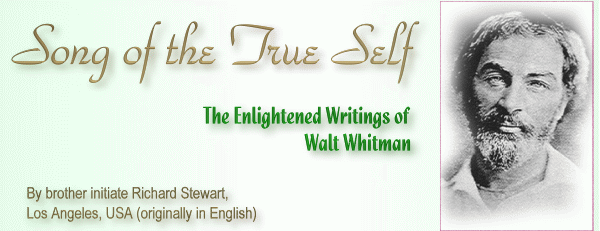![]()

In discussing such experiences, Master says, "Because the universe is vast and is contained within ourselves, an ordinary person who gets enlightenment will see Light and hear Sound - Light of different colors or brilliance, sometimes more than a thousand suns. Most people see immediate Light from God."
After his enlightenment, Whitman also seemed to be in an almost constant state of samadhi, for he wrote in his notebook, "I cannot understand the mystery, but I am always conscious of myself as two (as my soul and I)." And throughout his poetry he uses the term "witness" to describe this curiously involved yet detached day-to-day experience of being "both in and out of the game" of life, as he calls it in "Song of Myself." Master describes this experience as follows:
"Samadhi means that you are in ecstasy, in bliss, tranquility and Light. You can be in ecstasy while living in this world every day through meditation, devotional longing or any type of ritual. When you are in samadhi, you forget the whole world. Sometimes you can hear the people around you, but cannot relate to the world."
Upon achieving some level of enlightenment, Whitman also became aware of the illusory nature of suffering, of which Master states, "All the perfect Masters say, 'Everything is perfect under the sun.' Jesus said, 'You are all the children of God.' They realize there is nothing to do; everyone is perfect. But we do not realize it yet, so we suffer. We have to realize the same as they do, and then we know why. Then we look at suffering as not suffering. You don't suffer. You do not sink into the suffering, but just float on top of it." Whitman showed his understanding of this principle in the following lines:
The real or fancied indifference of some man or woman I love,
The sickness of one of my folks or of myself, or ill-doing or
loss or lack of money, or depressions or exaltations,
Battles, the horrors of fratricidal war, the fever of doubtful
news, the fitful events;
These come to me days and nights and go from me again,
But they are not the Me myself.
Here the poet recognizes that the True Self ("the Me myself") doesn't really suffer from the pain caused by others, by personal or family illness, by societal problems, etc.
![]()
Based on abundant evidence from his biography and writings, it is apparent that Walt Whitman experienced some level of enlightenment during his lifetime, and that he expressed it in powerful, glowing terms for the whole world to appreciate. His intense love of others and identification with all of creation shines forth from his poems and prose works, and his profound influence on future generations of writers, artists and social reformers bears witness to the depth of his illumination, and his loving, world-embracing character. Whitman's tireless charitable work with the sick and less fortunate and his empathetic descriptions of nature also suggest that he had an enlightened person's understanding of the oneness of all beings and an ability to express love and compassion to all forms of life, down to the tiniest ants and lowliest plants - the leaves of grass.
He incarnated during a time in history, the beginning of the industrial age, when the United States and the world as a whole needed a voice of inspiration and understanding in order to move into a new era of challenge and change. And the similarity of Walt Whitman's words and ideas to those of Supreme Master Ching Hai and other great Masters serves as a refreshing message of hope that, even from the humble working classes of nineteenth century industrial America, an enlightened messenger of love and compassion could emerge to encourage and uplift the world. As the new millennium dawns, Whitman's compassionate, humanitarian outlook, together with his spiritual vision encompassing all religions can continue to inspire us all.